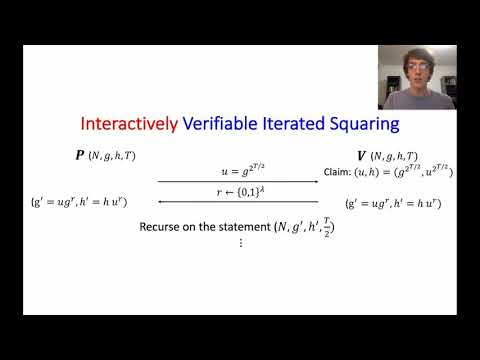CryptoDB
Fiat-Shamir for Repeated Squaring with Applications to PPAD-Hardness and VDFs
| Authors: |
|
|---|---|
| Download: |
|
| Conference: | CRYPTO 2020 |
| Abstract: | The Fiat-Shamir transform is a methodology for compiling a (public-coin) interactive proof system for a language $L$ into a {\em non-interactive} argument system for $L$. Proving security of the Fiat-Shamir transform in the standard model, especially in the context of \emph{succinct} arguments, is largely an unsolved problem. The work of Canetti et al. (STOC 2019) proved the security of the Fiat-Shamir transform applied to the Goldwasser-Kalai-Rothblum (STOC 2008) succinct interactive proof system under a very strong ``optimal learning with errors'' assumption. Achieving a similar result under standard assumptions remains an important open question. In this work, we consider the problem of compiling a different succinct interactive proof system: Pietrzak's proof system (ITCS 2019) for the iterated squaring problem. We construct a hash function family (with evaluation time roughly $2^{\lambda^{\epsilon}}$) that guarantees the soundness of Fiat-Shamir for this protocol assuming the sub-exponential ($2^{-n^{1-\epsilon}}$)-hardness of the $n$-dimensional learning with errors problem. (The latter follows from the worst-case $2^{n^{1-\epsilon}}$ hardness of lattice problems.) More generally, we extend the ``bad-challenge function'' methodology of Canetti et al. for proving the soundness of Fiat-Shamir to a class of protocols whose bad-challenge functions are {\em not} efficiently computable. As a corollary (following Choudhuri et al., ePrint 2019 and Ephraim et al., EUROCRYPT 2020), we construct hard-on-average problems in the complexity class $\mathbf{CLS}\subset \mathbf{PPAD}$ under the $2^{\secp^\epsilon}$-hardness of the repeated squaring problem and the $2^{-n^{1-\epsilon}}$-hardness of the learning with errors problem. Under the additional assumption that the repeated squaring problem is ``inherently sequential'', we also obtain a Verifiable Delay Function (Boneh et al., EUROCRYPT 2018) in the standard model. Finally, we give additional PPAD-hardness and VDF instantiations demonstrating a broader tradeoff between the strength of the repeated squaring assumption and the strength of the lattice assumption. |
Video from CRYPTO 2020
BibTeX
@inproceedings{crypto-2020-30532,
title={Fiat-Shamir for Repeated Squaring with Applications to PPAD-Hardness and VDFs},
publisher={Springer-Verlag},
doi={10.1007/978-3-030-56877-1_22},
author={Alex Lombardi and Vinod Vaikuntanathan},
year=2020
}

